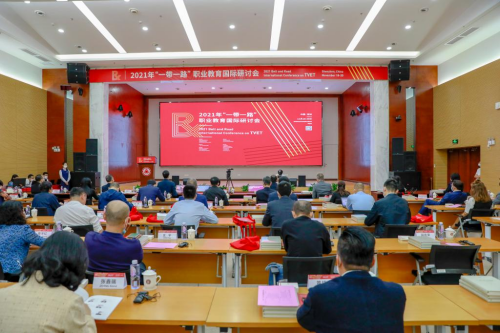
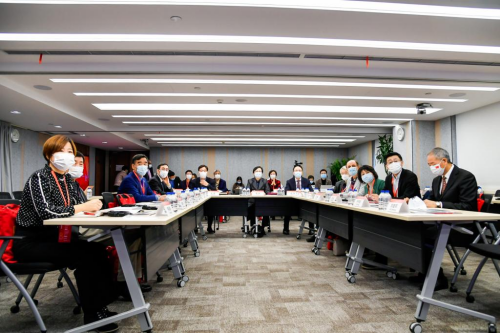
2021 Belt and Road International Conference on TVET unveiled in Beijing and Shenzhen via digital means.
On November 19-20, 2021 Belt and Road International Conference on TVET themed "Openness • Cooperation • Mutual Benefits — Jointly Building a Global Community of Skills for Mankind" was held in Beijing and Shenzhen via digital means. The conference brought together more than 800 leaders, experts, and scholars from 36 countries and regions, including government departments, institutions, and enterprises, to discuss the mission and role of vocational education in serving the "Belt and Road" and the construction of the human community with a shared future, and to forge a broad consensus. TheOverview of Vocational Education in Countries Along the Belt and Roadand Belt and Road Vocational Education Development Report were released at the conference. This is another international event in the field of vocational education since the Belt and Road International Conference on TVET was successfully held in 2018 and 2020.
Lu Xin, President of the Chinese Society of Technical and Vocational Education and former Vice Minister of the Ministry of Education of the PRC, attended the meeting and delivered a speech.Fang Jun, Deputy Director-General of the Department of International Cooperation and Exchange of the Ministry of Education, Qin Changwei, Secretary-General of the Chinese National Commission for UNESCO, Yue Yanghua, Director of the Center for Contemporary World Studies of the International Department of Central Committee of CPC, Fang Jin, Secretary-General of China Development Research Foundation, Long Yuxiang, Executive Chairman of China International Culture Communication Center, Wu Yanling, Second Inspector of the Department of Education of Guangdong Province, Yang Xinbin, Secretary of the Party Committee of Shenzhen Polytechnic, Shahbaz Khan, Director of the UNESCO Representative Office in China, and Antti Rantakokko, President of the Finnish Association of Mayors, and other guests delivered speeches.Liu Jiantong, the Executive Vice President and General-Secretary of the Chinese Society for Technical and Vocational Education, presided over the inauguration.
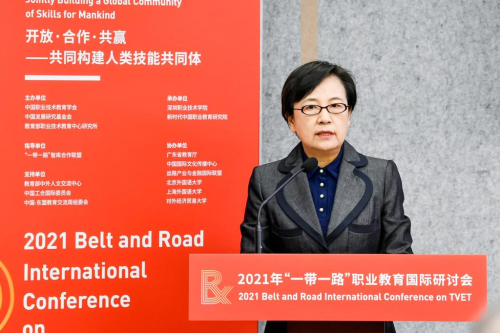
Lu Xin pointed out in his speech that Belt and Road International Conference on TVET had been held twice with fruitful results. With the theme of "Openness • Cooperation • Mutual Benefits — Jointly Building a Global Community of Skills for Mankind", this conference aims to deepen cooperation in vocational education along the Belt and Road, discuss the common challenges faced by global vocational education in the context of economic globalization and digital economy, focus on the role of vocational education in the formation and construction of skills, strengthen the important role of skills in enhancing individual employment competitiveness, serving industrial optimization and upgrading, and maintaining the stability of the supply chain of the global industrial chain. It will inject new impetus and carrier for the construction of a human community with a shared future through building a global community of skills for mankind.
Lu Xin reviewed with detailed data the situation of Chinese vocational education serving international capacity cooperation and Chinese and foreign humanities exchanges during the construction of the "Belt and Road". She pointed out that the current intertwining of the world's century-old changes and the epidemic requires deepening skills cooperation, and there is an urgent need to build more platforms for digital promotion of skills and humanistic exchanges in the field of vocational education. The developing digital economy and the integrated innovation of new technologies put forward new requirements and challenges to the quality structure, competence structure, and skills of talents, and will also reconfigure the world skill system. In the face of new industries, newbusinesses, new models and new occupations dominated by digital skills, how vocational education should respond and provide talent and skills support for global digital transformation is a common challenge faced by the whole world.
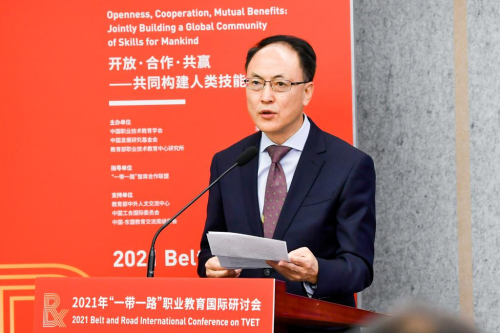
Fang Jun said that the Ministry of Education attaches great importance to the role of vocational education and promotes practical cooperation between Chinese and foreign vocational education through a two-pronged approach of "bringing in" and "going global". On the one hand, it focuses on "bringing in" high-quality resources and will deepen the integration of industry and education. In Europe, for example, by building a dual platform for the integration of industry and education between China and Europe, we have carried out in-depth cooperation with leading European enterprises such as Bosch, Siemens, and Schneider Electric, focusing on the construction of practical training centers and talent training in automotive, information technology, high-end equipment, new energy, and intelligent manufacturing. On the other hand, we actively support vocational institutions to "go global" and contribute Chinese wisdom. At present, cooperation platforms such as the Luban Workshop have gradually become influential in countries along the Belt and Road, and vocational colleges have started to team up with Chinese enterprises to go abroad in order to assist in cultivating high-quality skilled talents in these countries.
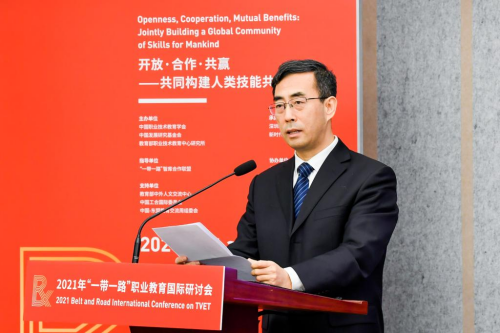
Qin Changwei believed that three things should be done to promote change in vocational education. The first one is to make full use of the demand so that we can grasp the new skill demands brought about by a changing world, changing technology, and changing young generation. The second is to use the context of the education technology revolution and promote revolutionary changes in vocational education through the transformation of educational technology so that education satisfies the people. Third, the international cooperation platform should be used by all to build consensus, exchange experiences, and share resources, so as to form a strong synergy for change in vocational education.
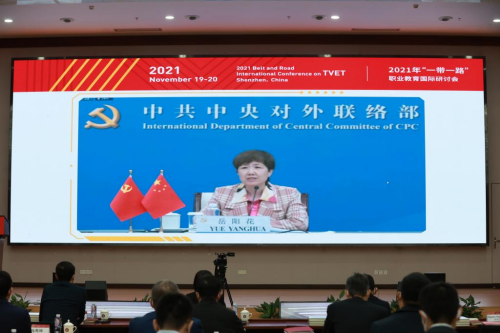
Yue Yanghua said that the human community with a shared future has become the distinctive banner for the direction of human beings, and in this context, it is particularly important to adhere to the principle of "Extensive Consultation, Joint Contribution and Shared Benefits", participate extensively in the "Belt and Road" international cooperation platform, and provide Chinese solutions and Chinese wisdom for global governance. She also shared four reflections on international cooperation in vocational education on the Belt and Road. First, we should strengthen resource sharing and gradually build a regional community of international cooperation. Second, we should deepen market matching, expand characteristic training, specialized training, and skills training, and cultivate talent with skills specifically needed for the "Belt and Road" construction. Thirdly, we should promote people-to-people exchanges and mutual dialogues and understanding among the people, especially the young people. Fourth, we should give full play to the role of a think tank to carry out the assessment, research, theoretical support, and directional leadership for international cooperation in vocational education on the "Belt and Road".
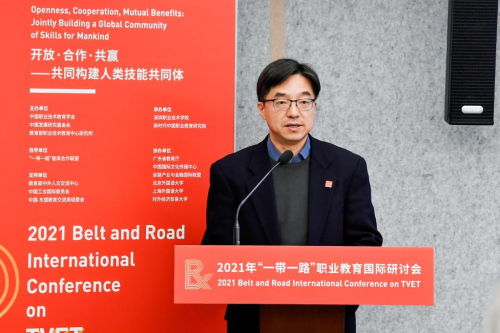
Fang Jin said China's vocational education has made promising achievements in recent years, with about 58 million highly skilled personnel, accounting for nearly 30% of the total number of skilled personnel. In response to the inadequate development of regional vocational education, China Development Research Foundation has conducted social experiments and research projects in Sichuan and Guizhou in order to explore local paths to improve human capital levels for sustainable poverty elimination and provide models for other regions.In the future, the Foundation will work with partners from the education departments, enterprises, social organizations, and other parties to participate in cultivating new types of skilled personnel and exploring vocational education development models.
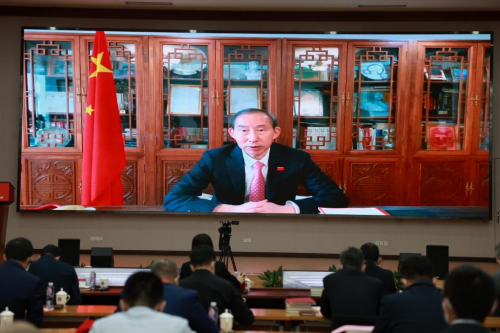
Long Yuxiang said that China's vocational education has made great development and fully demonstrated its role as a communication link in humanities exchanges with countries along the "Belt and Road". Guided by Xi Jinping Thought on Socialism with Chinese Characteristics for a New Era, it has earnestly implemented the spirit of the Sixth Plenary Session of the 19th CPC Central Committee and followed the fundamental principle of providing moral education. Meanwhile, it took the construction of a high-quality education system as the overall goal, further promoted the vocational education system with Chinese characteristics to go out, brought in the experience of vocational education development of other countries in the world, and transformed the General Secretary's ardent expectation for vocational education to be "promising" into actions in the frontline.
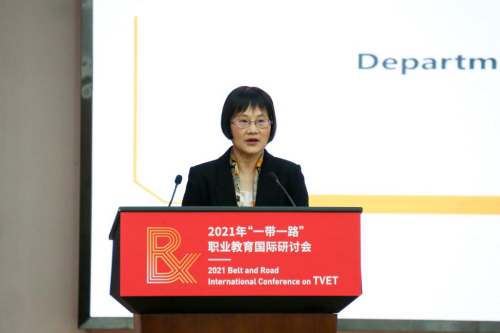
Wu Yanling expressed that Guangdong is an important part of China's "Belt and Road" strategy, and it is the duty of Guangdong vocational education to serve the construction of the "Belt and Road". Guangdong has seized the strategic opportunity of implementing the "Belt and Road" and issued an action plan on promoting the "Belt and Road" education, which aims to help many vocational colleges and universities, such as Shenzhen Polytechnic, to go global by serving the industrial development of countries along the "Belt and Road" and cooperation in school operation and school-enterprise cooperation.Guangdong is willing to work with countries along the "Belt and Road" to jointly build a global community of skills for mankind through openness, cooperation and mutual benefits, so that it can make contributions to the global interconnection more countries and more people can share the fruits of vocational education development.
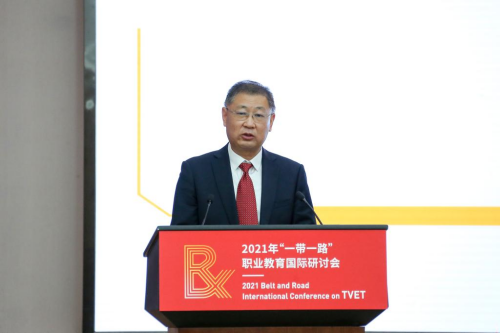
Yang Xinbin said that as an important initiative to further implement the spirit of General Secretary Xi Jinping's important instructions on vocational education and the "Belt and Road" initiative, the Belt and Road International Conference on TVET has been held for three consecutive sessions since 2018, and has achieved a series of fruitful results in education cooperation, skills development, and humanistic exchanges, making positive contributions to deepening mutual learning and appreciation of vocational education in countries along the "Belt and Road" and building a "Belt and Road" community of vocational education.In the future, Shenzhen Polytechnic will make full use of its geographical advantage. Shenzhen is the "window" of China's opening up to the outside world, so it will widely carry out international exchanges and cooperation, and contribute more to promoting vocational education "going out" and building a brand of vocational education with Chinese characteristics.

On behalf of the UNESCO Office in China, Mr. Shahbaz Khan congratulated the success of this conference.He said the Covid-19 pandemic has brought challenges and opportunities globally, making vocational education a promising area in health, Industry 4.0, and rural revitalization. The UNESCO Vocational Education Project works to develop vocational education policies, upgrade vocational education, develop regional capacity, and set global standards. He hoped that UNESCO would work together with countries along the Belt and Road to establish a framework for vocational education qualifications so that vocational education could become an important area for revitalizing development in each country and creating a better world of peace and sustainable development.

Mr. Antti Rantakokko also expressed that vocational education was closely related to socio-economic development, and we must be aware of industry trends in order to constantly update the vocational skill portfolio and create quality education.Universities, particularly vocational and technical colleges, can engage in specialized technical research that drives economic development and industry continuously. Therefore, enhanced cooperation among institutions, especially with some international institutions, can undoubtedly help us to forge ahead in the digital age.
At the Conference, it was noted that the Chinese Government attached great importance to the development of vocational education and promotes reform and innovation in vocational education in China with an ambitious international vision. On April 12-13, 2021, a national conference on vocational education was held in China, at which President Xi Jinping gave important instructions on vocational education and considered this industry as one with "a broad future and great potential". At the conference, it is proposed to strengthen theoretical research on building a skill-based society andaccelerate the construction of a high-quality modern vocational education system,so as to speed up the construction of a skill-based society in which the country attaches importance to skills, the society respects skills, everyone learns skills and everyone has skills. The Ministry of Education of the People's Republic of China has actively responded to the challenges brought by global digital transformation, studying and developing a new version of the specialty catalog for vocational education in order to build a new knowledge, technology and skills system for vocational education.
The conference put forward five initiatives. The first one is to deepen theoretical innovation in vocational education and strengthen the construction of think tanks; second, innovate vocational education cooperation models and deepen skills cooperation; third, build a vocational education sharing platform and promote skills transformation; fourth, provide equitable access to vocational education and skills to help reduce poverty; and fifth, enhance the contribution of vocational education so that skill can drive economic growth. It was pointed out at the conference that we must root in the fertile ground of international cooperation on the Belt and Road, adhere to the concept of openness, cooperation, and mutual benefit, and contribute to sustainable human development, economic growth of countries and regions along the Belt and Road through jointly building a global community of skills for mankind.
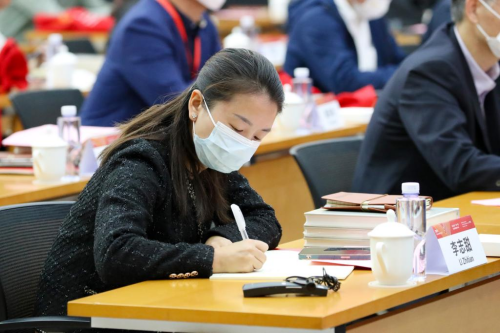

The guests are listening attentively.
The conference was rich in content and diverse in format, with three separate sessions, namely the inauguration, keynote speeches and the guest forum.During the session of delivering keynote speeches, Prof. Erich Thies, former Secretary-General of the Joint Conference of German Ministers of Education and Culture, Michael Crook, President of the International Committee for the Promotion of Chinese Industrial Cooperatives, Maria Gustava, Ambassador of the Republic of Mozambique to China, Marshall Louis Alferez, Consul General of the Philippines in Guangzhou, and Martin Fleischer, former Consul General of Germany in Guangzhou, gave keynote speeches on the theme of "Openness • Cooperation • Mutual Benefits — Jointly Building a Global Community of Skills for Mankind".In the guest forum, 25 government officials, experts, and scholars from home and abroad discussed the following topics: prospects of quality development of modern vocational education; innovative cases of international cooperation in vocational education, vocational education and the building of a global community of skills for mankind; the mission of vocational education in the quality development of the "Belt and Road"; the transformation into the skills society and the innovative development of vocational education; the responsibility of vocational education to contribute to people's wonderful life; digital transformation: the Chinese solution to vocational education; etc. They discussed how vocational education can be thoroughly implemented from concept to actions so that it can provide strong talent and skills support for the quality development of "Belt and Road" and help build a community of shared future for mankind.
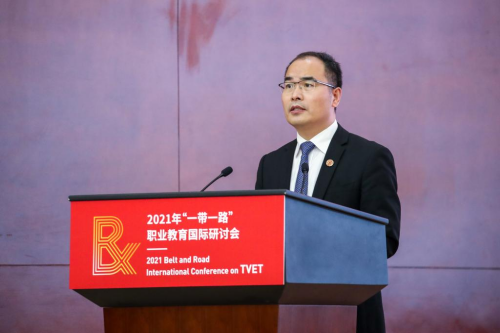
In the guest forum held on November 20, President Xu Jianlingshared the experience and practice of Shenzhen Polytechnic on the theme of "Digital Transformation".He said that in recent years, through measures such as accelerating the digital transformation of specialized courses, in-depth cooperation between schools and enterprises to cultivate digital technical skills talents, accelerating the digital transformation of talent training approaches, and helping the development of lifelong education in the context of the digital economy, Shenzhen Polytechnic took the initiative to optimize the specialty structure in line with the digital industry, courageously carried out digital transformation development, and constructed a new pattern of vocational education development, which has effectively improved the quality of talent training and contributed the "Shenzhen Polytechnic experience" of vocational education digital transformation to the world.
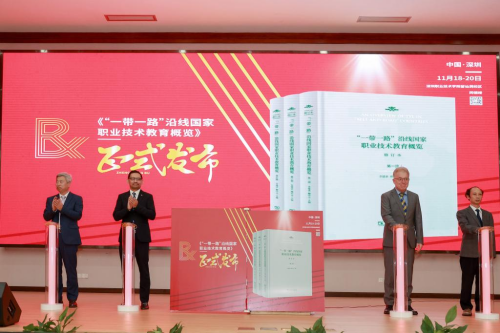
TheOverview of Vocational Education in Countries Along the Belt and Roadand Belt and Road Vocational Education Development Reportwere released at the conference.
The Overview of Vocational Education in Countries Along the Belt and Roadand Belt and Road Vocational Education Development Report were released at the conference (hereinafter referred to as theOverview and theReport, respectively).The Overview introduces the basic situation, education system, national academic system, number of institutions, and education policies of the countries along the Belt and Road, focusing on the development strategies and relevant regulations, existing systems and quality assurance, governance models, and faculty of each country. It provides references and lessons for the exchange and cooperation between China and the countries along the Belt and Road in multiple levels and forms.TheReport, jointly prepared by the Chinese Vocational and Technical Education, the Working Committee on Foreign Language Education of the Chinese Society for Technical and Vocational Education and the School of International Education of Beijing Foreign Studies University, collects and organizes typical cases of vocational education cooperation and exchange and vocational skills training between vocational institutions in China and countries along the Belt and Road, and presents new models and solutions of international cooperation in vocational education with Chinese characteristics in the new era.These two documents will be regularly issued later.
At the conference, China Development Research Foundation also launched the "To Win the Future" school-enterprise cooperation action plan in cooperation with several well-known enterprises.The plan aims to build a cooperation platform for vocational colleges and enterprises, explore the development model of integration of industry and education in vocational education, and enhance the role of enterprises in the development of vocational education.
The conference was co-organized by the Chinese Society of Technical and Vocational Education, China Development Research Foundation, and Central Institute for Vocational and Technical Education under the guidance of BRI Think-tank Cooperation Association, and organized by Shenzhen Polytechnic and China Institute of New Era TVET Research in collaboration with China International Culture Communication Center, Beijing Foreign Studies University, Shanghai International Studies University, University of International Business and Economics, and Silk-Road Industry and Finance International Alliance. Meanwhile, it is supported by the International Committee for the Promotion of Chinese Industrial Cooperatives, China-ASEAN Education Cooperation Week, and the Chinese and Foreign Humanities Exchange Center of the Ministry of Education.
 School Motto:
School Motto:
 Search
Search
 School Motto:
School Motto:
 Search
Search